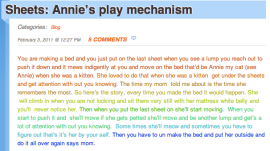I first participated in the National Writing Project (NWP) back in 1987 or so, I think, at the University of Virginia. The main thing I remember from that experience was kids had to experience choice to make writing meaningful for them. I kinda think they need to experience as much choice as we can give them to make anything meaningful to them. I’ll probably do a series of posts on the NWP and the impact it’s had on my life as a writer and a teacher, but this one will be about that choice–and how we all forget how important it is sometimes.
When I had my 5th grade literacy group all year, I used a wiki, WhitesLitGroup, to communicate with both the students and the parents. It was mostly one way (me to them) and didn’t turn out at all to be the interactive experience I’d hoped it would, although, it you click on the “Table of Contents” link, there is a LOT of stuff there! The “Daily Doings” link was my “morning message” to them as they walked in–it gave them different info each day. Sometimes it was specific directions, sometimes, an overview, sometimes a reminder–but it got our day going….
I remember I had this awesome idea to teach both media literacy and support their reading non-fiction, while integrating content from Social Studies. I asked the question, “Was John Smith an historian or a liar?” I primed these 5th graders well–I told them the story of Pocahontas saving JS had been told by him no fewer than three times, all situated in different countries on his explorations. I explained that researchers had a theory it was simply a ritual to invite others into their tribe. I challenged everything they thought they “knew” about John Smith and even spoke to the lack of knowledge of teachers have sometimes. I honestly admitted I had only learned these things the prior summer when I took a week long class in Jamestown and actually got to visit Werowocomoco, the site of Powhatan’s tribal village. Initially they were intrigued they were learning stuff many teachers didn’t know.
They were engaged in our conversations, they were able to cite verbally information from the non-fiction reports and essays I had found online, as well as from the book excerpts I shared from my summer class. But, at the end of our study, when I asked them to take a stand, and then assess themselves through a rubric we constructed (found here) you can read for yourselves their responses–and they’re mostly really bad. AND the kids assessed themselves pretty accurately.
Now, I’m teaching a bunch of kids who are high performers or gifted…who are used to getting straight A’s on their report card, or darn close to that…who are often perfectionists, or at least want to be seen as doing an amazing job…who are highly motivated to succeed. But on this task, they didn’t succeed, the work was sloppily done at best, and there were no examples I saw as exemplary to even talk about what “good” was. So I asked them why the work was so bad. I asked them why they judged themselves so low and why were they happy with that.
Their responses?
We’ll never know what the truth is, so who cares?
We didn’t choose this question–you did–we don’t care either he was lying or telling the truth.
We could argue one way or the other, but we cant go back there, so what does it matter?
and there were more variations on those themes….
Once again, I get feedback that choice is important…that inquiry should be individual, or co-constructed at the very least….that the teacher’s questions may not be germaine to the students….that research skills and media literacy need to be useful to the students for them to engage…and that even really smart, high performing kids will blow off what they deem to be a stupid assignment.
So, choice…..
Is it meaningful? (A choice between a powerpoint and a prezi is not meaningful choice–that’s choosing options determined by the teacher.)
Is it worthwhile? (These kids clearly didn’t get my agenda that history is constructed based on what we know and it is always subject to interpretation–or maybe they did, even better than me–and they chose not to engage with this particular dichotomy.
Is it substantive? (Where were the choices in this work? If you nose around on the wiki, you’ll see all kinds of educationalese…but does it matter to the kids?)
The NWP–in 1987–tried to teach me about choice…but I need reminders….and I need to think through what actions I can take to amplify student thinking better…. That’s the purpose of this blog.
